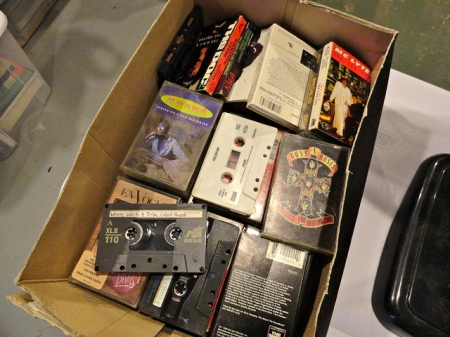
Media technologies are additive
October 11, 2011I’ve been watching the debate over Amazon’s e-book rental service, announced a few weeks ago. I can’t help but notice how it recapitulates the debate over streaming music.
Here’s a pretty normal day for me and music: I’ll listen to the radio in my car en route to work. I take my iPod, loaded with MP3s, to the gym. At my desk, I stream music via Spotify, or Last.fm, or by using ex.fm for MP3 links, or Hype Machine, or more. Or I stream more radio. On the way home, I listen to CDs (my car is too old to have an auxiliary input). I might stream Spotify to my phone as I walk out to meet friends for dinner. And I’ll put a vinyl record on when I come home.
Similarly, my office is full of text. Textbooks. Large-format coffee-table style books. My Kindle. Hand-bound copies of all of my theses. PDF e-books on my computer. Printouts of manuscripts to review. Bookmarks to online texts in my browser. Novels: hardbound, trade and pocket paperback. On my phone, Kindle and Instapaper. Workbooks.
I recently downloaded a number of illustrations from Ernst Haeckel’s 1904 book, Kunstformen der Natur, from the Wikimedia Commons. They first existed as sketches, then engravings, then the lithographs that went into the book. Someone scanned the pages and uploaded them as high-resolution images, which I downloaded, opened in image-editing software, converted to greyscale and resized, and then downloaded to serve as the screensavers on my Kindle.
It’s a fallacy to think that the existence of one technology supplants another. Sure, technologies become obsolete. But as a user and a lover of the content (the text, or the music, or the images), I’m not interested in hurrying up the process. Different technologies have different affordances, and my primary interest is in being able to reach for the most appropriate one for my purpose.
[photo: lost box of tapes! by Flickr user wayneandwax, used here under its Creative Commons license]





You are confusing media and technology. Technologies are often obsoleted and become without context or use.
There isn’t a sharp divide between the two.
For example, a book is a medium for text. It’s also a specific technology (codices eventually replaced scrolls, for most purposes); we just don’t see it as that anymore.
A vinyl record is a medium. A turntable is a technology. Both are embedded in a larger infrastructure that supports their use and dissemination.
Whether you want to call it media or technology doesn’t change the central point: that each method of delivering content has different affordances, and there is no upside for the users in supporting the reduction of methods.
Yes but the title of the post says technologies are additive which is an unqualified universal assertion which is not true. Your assertion deals with a type of technologies called media.
That is an excellent point. Edited.
Interestingly enough, it turns out that technologies don’t ever go obsolete.
Kevin Kelly (kk.org, founding editor of Wired) came up with the theory that “there is no species of technology that’s gone globally extinct on this planet.”. Robert Krulwich interviewed him about this and did his best to crowdsource finding *some technology* that’s no longer made, and failed. It made for a very good Morning Edition story here: http://goo.gl/7R7DQ, with the conclusion here: http://goo.gl/ZuFlU.
On a related note, I enjoy Kelly’s most recent book “What Technology Wants” (http://goo.gl/4jqHF). Despite some of his high language about “The Technium”, he illuminated lots of the interesting ways that technologies fit into our evolution, and their own.
Thanks, Will.
While I certainly have enough cassette-loving friends that I don’t buy the traditional narrative of obsolescence, it’s fantastic to be reminded of the larger global perspective on the persistence of technology. I appreciate you pointing us to those pieces!